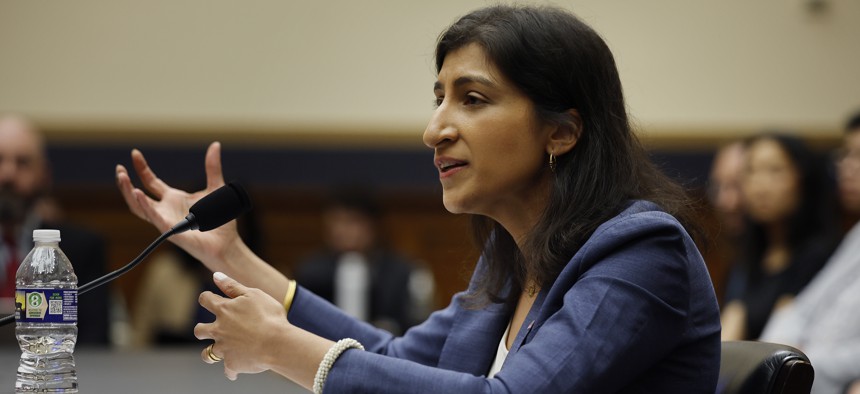Why the Amazon antitrust case is important to GovCon

Federal Trade Commission Chair Lina Khan testifies before the House Judiciary Committee in July. Gettyimages.com/ Chip Somodevilla / Staff
The antitrust lawsuit against Amazon might seem like a million miles away from government contractors, but they need to be prepared for ripple affects across the market.
The Federal Trade Commission isn’t going after Amazon's cloud computing business for antitrust issues, but it still might be worth following the lawsuit the FTC has filed against the global tech giant's retail business.
The FTC and 17 states are accusing Amazon of being a monopoly, raising allegations of how the company treats merchants and favors its own services.
The lawsuit announced this week is the biggest and boldest move by the FTC to enforce antitrust laws under the Biden Administration, but the government contracting market was put on notice last year when the FTC sued to stop Booz Allen Hamilton from acquiring Everwatch.
The FTC was unsuccessful in in its argument that the acquisition was anti-competitive because Booz Allen and EverWatch were the only bidders on a single National Security Agency contract. The FTC argued that Booz Allen made the acquisition to to guarantee it would ultimately win the contract.
The judge rejected that argument, agreeing with Booz Allen that the acquisition would make the company more competitive for dozens of other contracts. A single contract was not the driver behind the deal.
The two cases are very different, but both reflect a more aggressive antitrust stance by the FTC and its chair Lina Khan.
Khan first gained attention as a Yale Law School student when she published an article in 2017 using Amazon as an example of how U.S. antitrust laws are broken.
The Washington Post has an article comparing how Khan's views have changed from 2017 to today. She is still departing from decades of traditional antitrust regulation.
The lawsuit against Amazon is specific to that company, but it is part of a broader effort to address growing concerns about the power and influence of Big Tech. Companies such as Google, Microsoft, Meta and Apple are watching closely.
The “power of Big Tech” is a broad umbrella. Government contracting isn’t at the center of that umbrella, but is adjacent to it.
In the government market, we likely won’t see attempts to break up contractors or change the way they compete. But we will see more scrutiny and questions around large mergers and acquisitions.
The FTC failed in its challenge against the Booz Allen-Everwatch transactions, but companies should expect different types of questions and concerns than the usual Hart-Scott-Rodino reviews of mergers and acquisitions.
It is also important to note that the FTC isn’t looking to break up Amazon, despite calling them a monopoly. But the FTC wants to change the way Amazon does business.
I’m not an alarmist, but I think we should watch how the Amazon case develops and how it is resolved. The implications may take years to work out.
In the meantime, be prepared for more questions if you are making a significant acquisition.
